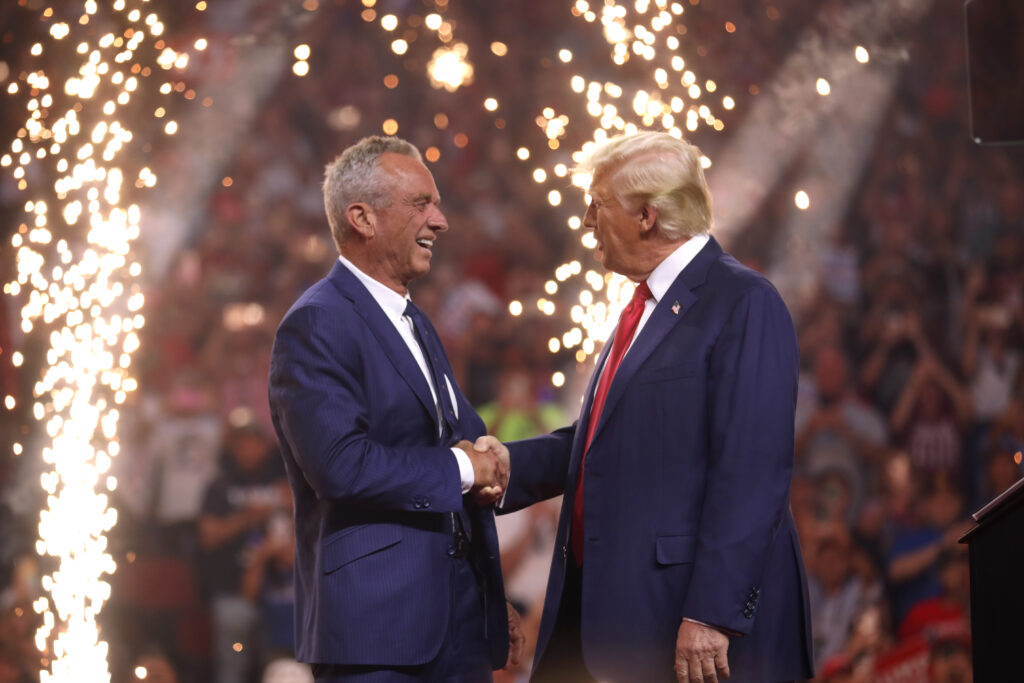In a significant and contentious decision, the U.S. Senate has confirmed Robert F. Kennedy Jr. as the new Secretary of Health and Human Services (HHS). Kennedy, a well-known environmental lawyer and outspoken critic of vaccines, will now be responsible for overseeing a vast array of federal health programs, including policies related to public health, vaccines, food safety, and medical research. His confirmation marks a turning point in the nation’s health administration, sparking debate among lawmakers, medical professionals, and the general public.

Robert F. Kennedy, Jr. & Donald Trump (53953048159) by Gage Skidmore from Surprise, AZ, United States of America is licensed under CC BY-SA 2.0.
A Polarizing Nomination
Kennedy’s appointment did not come without controversy. His nomination was met with fierce resistance from Democratic lawmakers, public health officials, and medical organizations, who raised concerns over his past statements questioning vaccine safety. Throughout his career, Kennedy has been an advocate for environmental causes, but he has also gained notoriety for promoting skepticism about vaccines. His views, which often contradict mainstream scientific consensus, have made him a divisive figure in the realm of public health.
Despite these concerns, Kennedy’s confirmation was pushed through the Senate largely along party lines. The Republican-controlled chamber supported his appointment, arguing that his stance on medical freedom and government transparency aligns with their broader policy goals. They praised his efforts to hold pharmaceutical companies accountable and his advocacy for individual rights in medical decisions.
Implications for Public Health
With Kennedy at the helm of HHS, many are questioning what this means for the future of public health in the United States. The department oversees agencies such as the Centers for Disease Control and Prevention (CDC), the Food and Drug Administration (FDA), and the National Institutes of Health (NIH). These organizations play a crucial role in managing disease outbreaks, regulating pharmaceuticals, and promoting vaccination programs.
Public health experts worry that Kennedy’s leadership could undermine vaccine confidence at a critical time. While vaccine hesitancy has been an issue in the U.S. for years, the COVID-19 pandemic brought renewed attention to the importance of widespread immunization efforts. The medical community fears that Kennedy’s influence may lead to reduced vaccination rates, potentially increasing the risk of preventable disease outbreaks.
Republican Support and the Push for Medical Freedom
Many Republican lawmakers defended Kennedy’s confirmation, arguing that his leadership would bring much-needed reform to the health sector. They view him as a champion of medical freedom, pushing back against government mandates and pharmaceutical industry influence.
Supporters believe Kennedy will challenge what they see as the overreach of federal health agencies and promote more transparent medical policies. His confirmation aligns with a broader movement within conservative circles that prioritizes personal choice in medical decisions, including vaccine mandates and alternative treatment options.
Public Reaction and Concerns
Kennedy’s confirmation has sparked mixed reactions from the public. His supporters, including those who have long questioned government health policies, see his appointment as a victory for medical autonomy. On the other hand, many doctors, scientists, and public health officials have expressed deep concerns, warning that his leadership could erode trust in scientific institutions.
Social media has been flooded with discussions, with some hailing Kennedy as a courageous reformer and others criticizing the decision as a dangerous move for public health. Many Americans are now looking to see how Kennedy will navigate his new role, particularly when it comes to policies surrounding vaccines, public health funding, and disease prevention efforts.
What’s Next?
As Kennedy assumes his new position, all eyes will be on how he shapes the future of public health policy in the United States. Will he soften his stance on vaccines now that he holds a leadership role, or will he push forward with his longstanding criticisms of government health mandates? His approach to handling major public health challenges, including future pandemics and regulatory policies, will be closely watched.
One thing is certain: Kennedy’s confirmation marks a significant shift in the country’s approach to health governance, and its impact will be felt for years to come.
